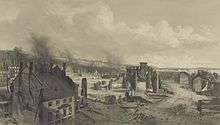1866 Great fire of Portland, Maine

The great fire of Portland, Maine sometimes known as the 1866 Great fire of Portland in Maine occurred on July 4, 1866—the first Independence Day after the end of the American Civil War. Five years before the Great Chicago Fire, this was the greatest fire yet seen in an American city. It started in a boat house on Commercial Street, likely caused by a firecracker or a cigar ash. The fire spread to a lumber yard and on to a sugar house, then spread across the city, eventually burning out on Munjoy Hill in the city's east end. Only two people died in the fire but 10,000 were made homeless and 1,800 buildings were burned to the ground. This included the federal Exchange Building by which was replaced with the custom house. Soon after the fire, poet Henry Wadsworth Longfellow described his old home town: "Desolation! Desolation! Desolation! It reminds me of Pompeii, the 'sepult city'."
References
- History of Portland, Maine (1886)
- Summers, Lydia B. ed. (1999). Portland. Greater Portland Landmarks.
- "Great fire of Portland 1866". Maine Memory Network. Maine Historical Society. Retrieved 2009-07-22.
- Horton, Linda (June 16, 2008). "Portland, ME Fire, Jul 1866 - Terrible Conflagration". gendisasters.com. Retrieved 2009-07-22.
Coordinates: 43°39′5″N 70°15′25″W / 43.65139°N 70.25694°W